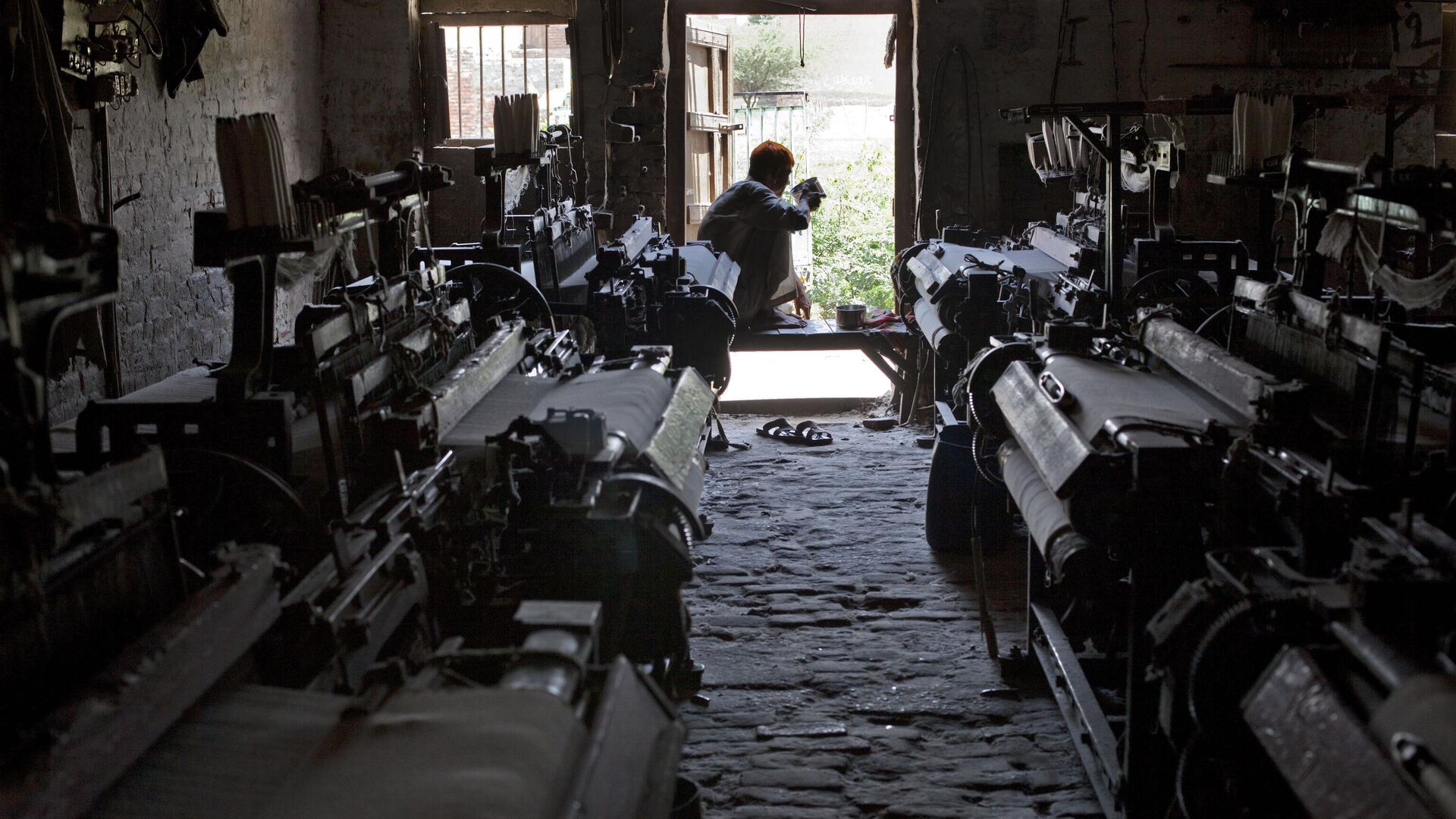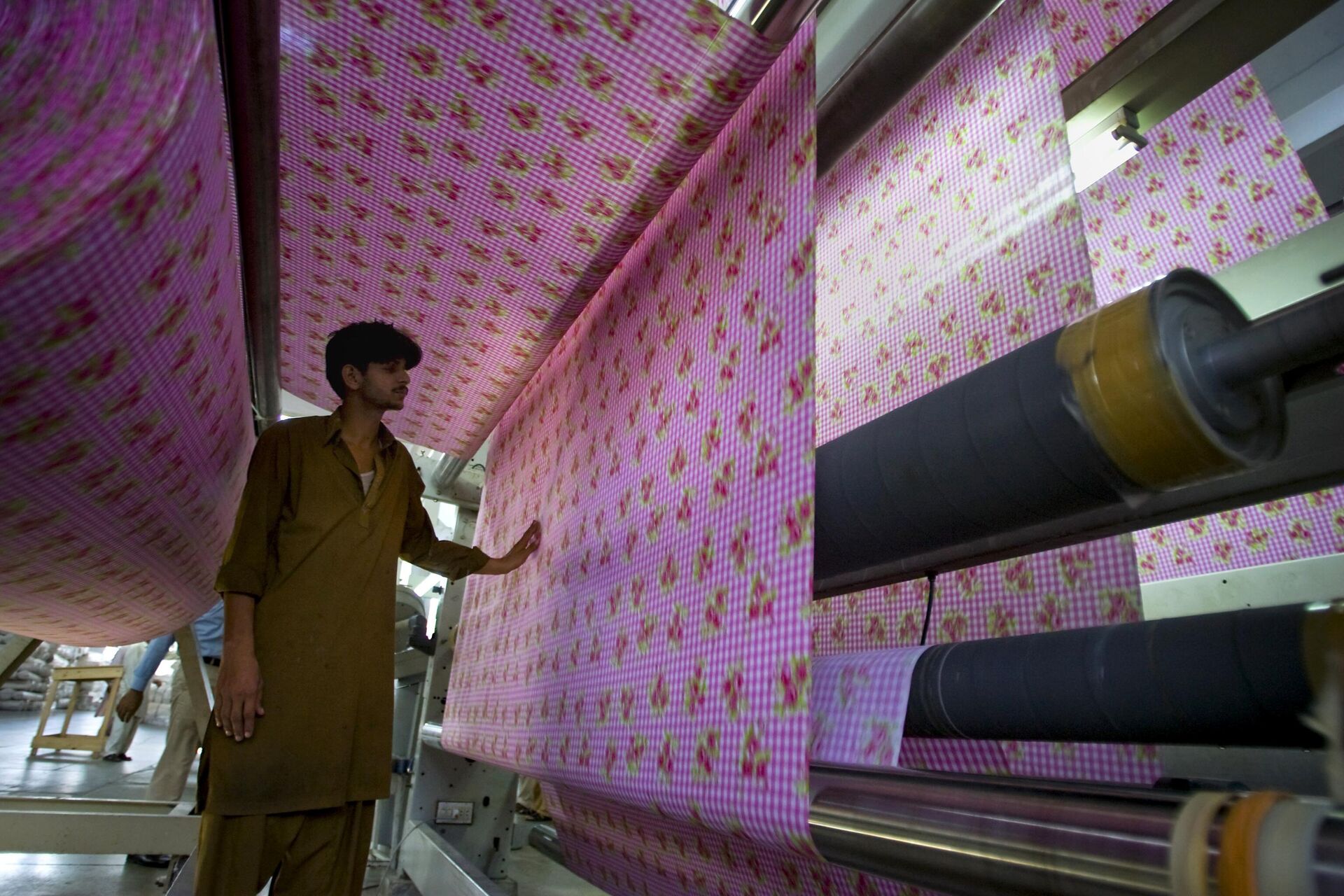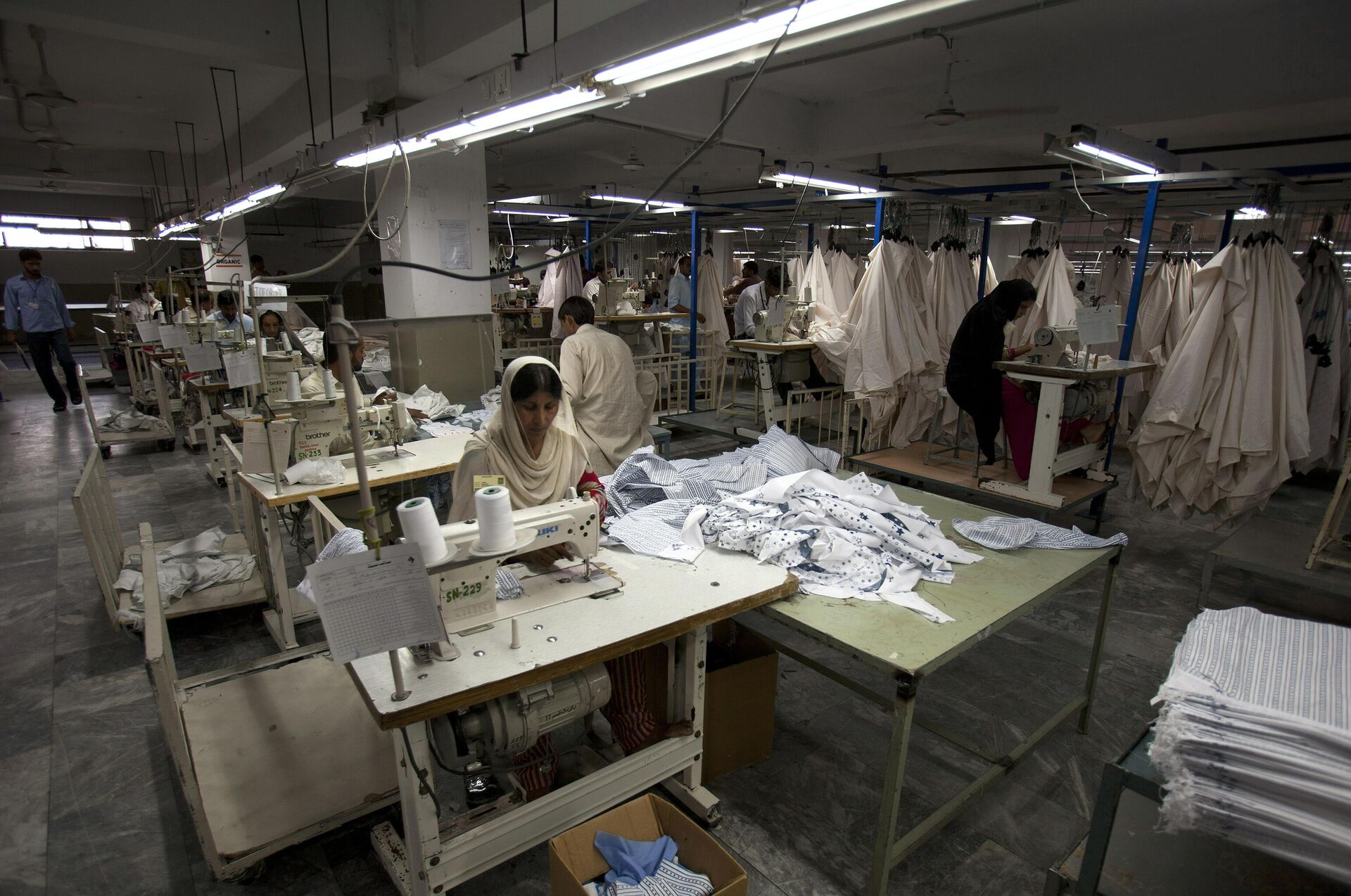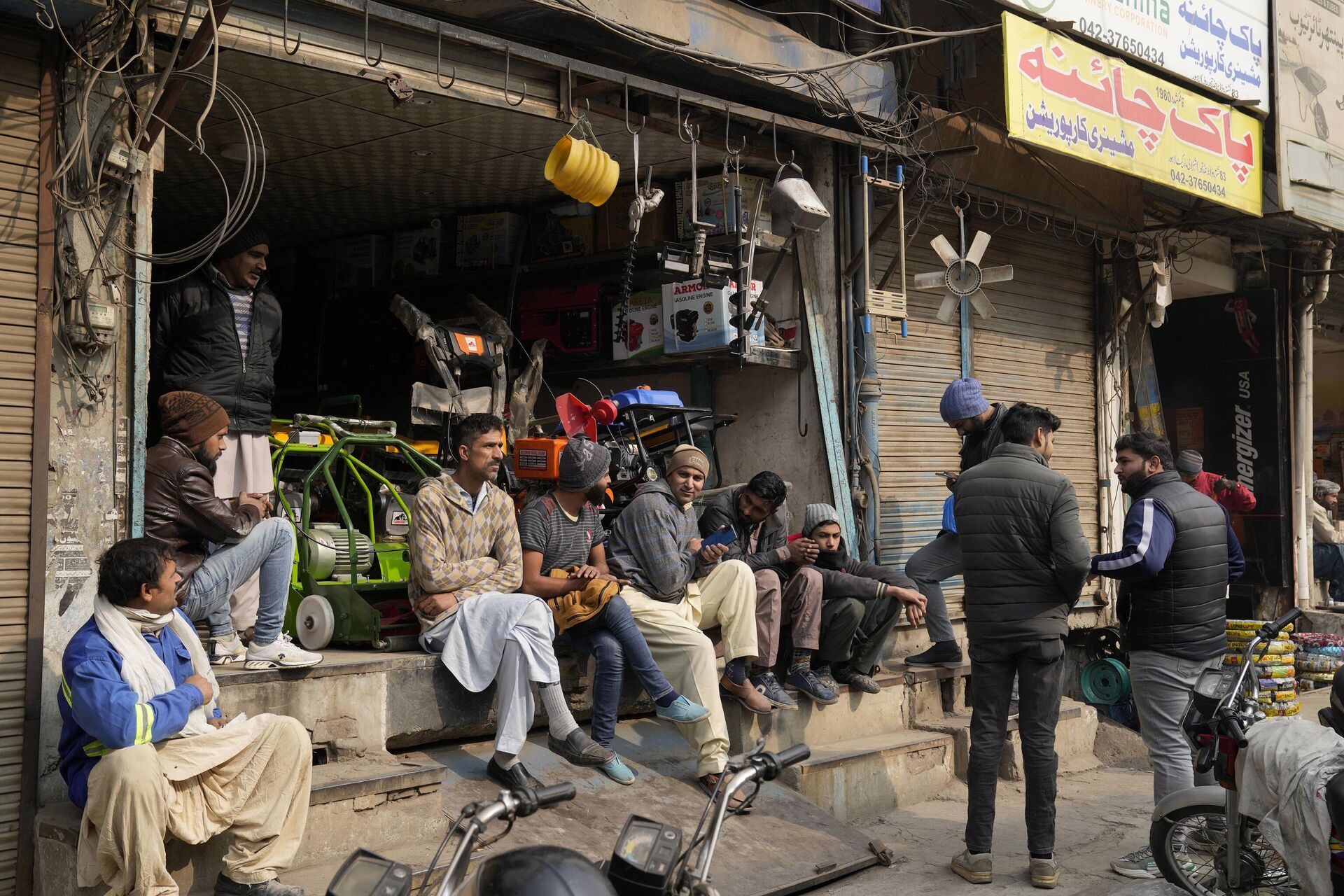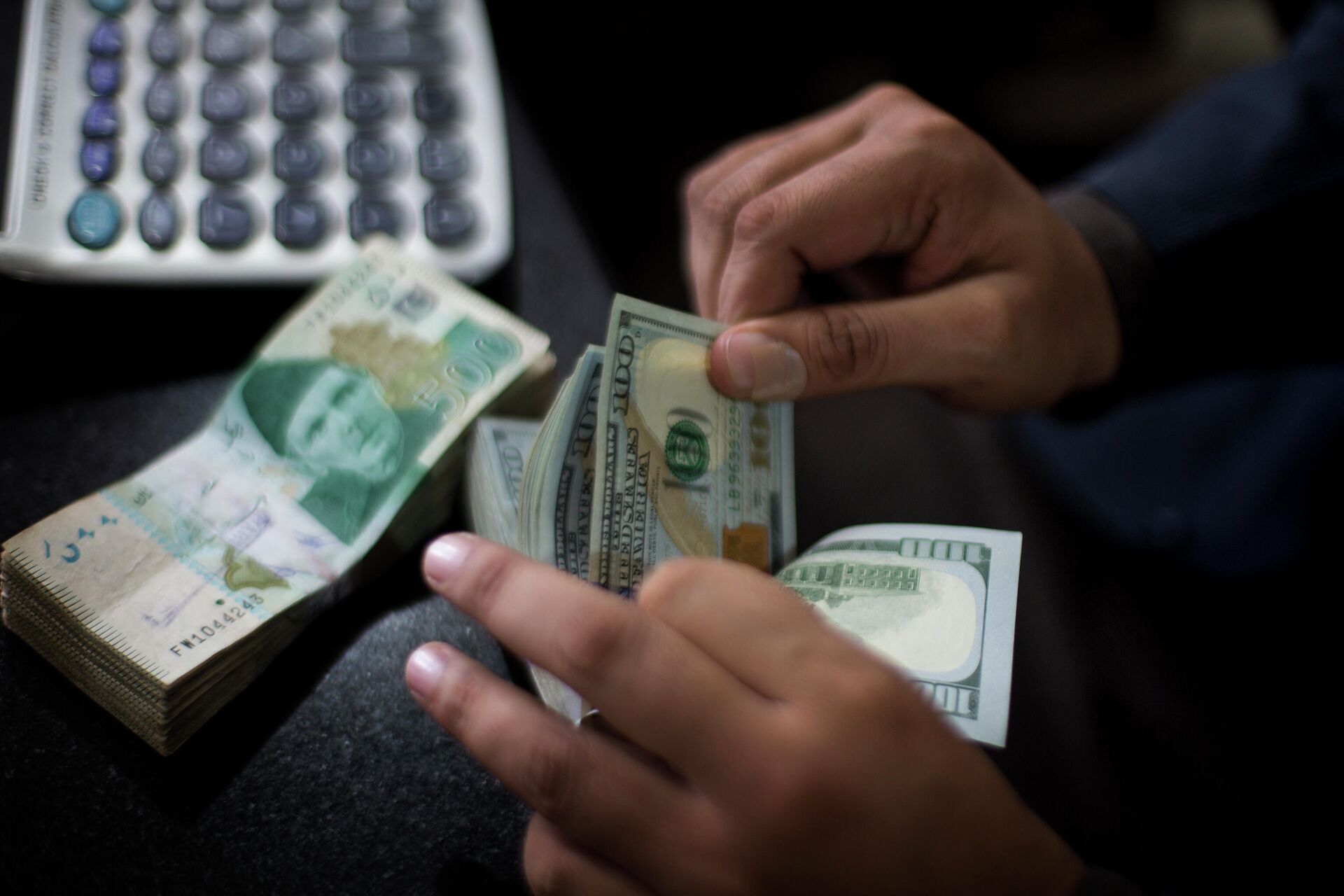https://sputniknews.in/20231206/thousands-lose-jobs-in-pakistan-amid-textile-industry-crisis----5721031.html
Thousands Lose Jobs in Pakistan Amid Textile Industry Crisis
Thousands Lose Jobs in Pakistan Amid Textile Industry Crisis
Sputnik India
Pakistan's economy is grappling with a significant setback, as over 1,600 textile factories have shut down in the past few months, highlighting deep-rooted economic challenges faced by the country.
2023-12-06T11:33+0530
2023-12-06T11:33+0530
2023-12-06T16:02+0530
pakistan
lahore
economic crisis
garment factories
youth unemployment
poverty
inflation
economic challenges
textile factories
textile industry
https://cdn1.img.sputniknews.in/img/07e7/0c/06/5722911_0:159:3077:1890_1920x0_80_0_0_e17c9982f5ba292d862371bde88c55e7.jpg
Pakistan's industrial manufacturing sector, like elsewhere in the world, has suffered from slowdown in global consumption and the rise in energy costs. However, due to the spiraling inflation and costs of production in Pakistan many textile factories have terminated their operations causing massive joblessness.It was reported that over 700,000 workers have lost their jobs recently following the closure of some 1,600 textile factories. This amounts to a third of the country's all textile factories, which contribute to 60% of the country's total export earnings.In 2022-2023, Pakistan's textile exports fell by 15 percent to $16.5 billion. Whereas, just two years ago, the country was on a high growth trajectory with textile exports projected to hit $25 billion.The textile industry has long been a cornerstone of Pakistan's economy, contributing substantially to its GDP and providing employment to a large portion of the workforce, about 20 million people.Hence, the recent closure of hundreds of factories not only disrupts the livelihoods of millions, but also exacerbates existing economic woes faced by the nation.Low Wages for Factory WorkersSputnik reached out to a former factory worker from Lahore, Sher Ali, who explained that despite working from dawn till dusk he was unable to earn enough money to sustain his small family.Despite joining a union which demanded more money and better working conditions for employees, Ali's employers refused to meet the workers demands.Textile Sector Crisis Weakens Pak EconomyOne of the ramifications of this crisis is the surge of unemployment in Pakistan, which will inevitably lead to a decline in consumer spending. As workers face financial instability, the demand for goods and services will diminish, impacting various sectors beyond textiles. This ripple effect can result in a broader economic slowdown, reducing overall economic output.Secondly, the closure of textile factories will have a negative effect on related industries and the supply chain. From raw material suppliers to transportation services, a drop in demand from the textile sector will impact numerous businesses, creating a domino effect that further weakens the economy.As pointed out by an Islamabad based observer, Shahid Zulfiqar, with the closing of 1,600 textile factories there is more uncertainty on the horizon.Meanwhile, many Pakistanis have already been forced to seek additional income, following rapid increase in the prices of energy and other essential commodities. But sadly the loss of jobs in the textile sector may lead to social unrest and increased poverty levels within the country.With a large segment of the population dependent on these jobs, the sudden loss of income can strain social systems and contribute to heightened levels of poverty, mental stress and inequality.According to the analyst, in the global context, Pakistan's reputation as a reliable supplier of textiles may also suffer, impacting international trade relationships. This, in turn, could hinder the nation's ability to attract foreign investments and loans, exacerbating the economic challenges it faces.Measures to Curb LossesAddressing these issues requires a comprehensive strategy, including targeted interventions to revive the textile industry, measures to retrain and upskill the displaced workforce, and initiatives to diversify the economy.Overall, the textile factories of Pakistan mark a critical juncture in the nation's economic trajectory.The repercussions of their closure may extend far beyond the textile industry, affecting employment, consumer spending and overall economic stability. Urgent and strategic interventions are needed to navigate these challenges and set the course for a more resilient and diversified economy.
https://sputniknews.in/20231126/formidable-group-why-pakistan-wants-to-join-brics-5581251.html
pakistan
lahore
Sputnik India
feedback.hindi@sputniknews.com
+74956456601
MIA „Rossiya Segodnya“
2023
Aneela Rashid
https://cdn1.img.sputniknews.in/img/07e6/0c/0d/74548_0:0:485:484_100x100_80_0_0_821526e967ae85d041e2d30ee34fa1de.jpg
Aneela Rashid
https://cdn1.img.sputniknews.in/img/07e6/0c/0d/74548_0:0:485:484_100x100_80_0_0_821526e967ae85d041e2d30ee34fa1de.jpg
News
en_IN
Sputnik India
feedback.hindi@sputniknews.com
+74956456601
MIA „Rossiya Segodnya“
Sputnik India
feedback.hindi@sputniknews.com
+74956456601
MIA „Rossiya Segodnya“
Aneela Rashid
https://cdn1.img.sputniknews.in/img/07e6/0c/0d/74548_0:0:485:484_100x100_80_0_0_821526e967ae85d041e2d30ee34fa1de.jpg
textile industry, pakistani economy, economic woes, low wages for factory workers, demanded more money, working conditions, costs of production, unemployment in pakistan, economic slowdown, negative effect on related industries, skyrocketing inflation, energy prices, textile industrialists, levels of poverty, trade relationships, economic recovery, textile factorys closures,
textile industry, pakistani economy, economic woes, low wages for factory workers, demanded more money, working conditions, costs of production, unemployment in pakistan, economic slowdown, negative effect on related industries, skyrocketing inflation, energy prices, textile industrialists, levels of poverty, trade relationships, economic recovery, textile factorys closures,
Thousands Lose Jobs in Pakistan Amid Textile Industry Crisis
11:33 06.12.2023 (Updated: 16:02 06.12.2023) Pakistan's economy is grappling with a significant setback, as over 1,600 textile factories have shut down in the past few months, highlighting deep-rooted economic challenges faced by the country.
Pakistan's industrial manufacturing sector, like elsewhere in the world, has suffered from slowdown in global consumption and the rise in energy costs. However, due to the spiraling inflation and costs of production in
Pakistan many textile factories have terminated their operations causing massive
joblessness.
It was reported that over 700,000 workers have lost their jobs recently following the closure of some 1,600
textile factories. This amounts to a third of the country's all
textile factories, which contribute to 60% of the country's total
export earnings.
In 2022-2023, Pakistan's textile exports fell by 15 percent to $16.5 billion. Whereas, just two years ago, the country was on a high growth trajectory with textile exports projected to hit $25 billion.
The textile industry has long been a cornerstone of Pakistan's economy, contributing substantially to its GDP and providing employment to a large portion of the workforce, about 20 million people.
Hence, the recent closure of hundreds of factories not only disrupts the livelihoods of millions, but also exacerbates existing
economic woes faced by the nation.
Low Wages for Factory Workers
Sputnik reached out to a former factory worker from Lahore, Sher Ali, who explained that despite working from dawn till dusk he was unable to earn enough money to sustain his small family.
"When I first came to Lahore from Arifwala town in central Punjab a couple of years ago, I was offered a job in a textile factory on the outskirts of Lahore. The work started right after the morning prayers around 5 a.m. and continued till late evening. It was very tough and exhausting, but the salary was very low," Ali said.
Despite joining a union which demanded more money and better working conditions for employees, Ali's employers refused to meet the workers demands.
"We tried to convince our manager to help us, he promised to take up our demands with the factory's board of directors but nothing ever changed. The manager blamed the country's economy, rising costs of production, less demand for textile goods and so on. He used to say that there is nothing the bosses can do because the factory was struggling to keep up the operations, hence they could not increase our wages. Eventually I found employment as a house cook and left the factory, but some of my friends stayed back. Recently they told me that our factory has shut down indefinitely," Ali explained.
Textile Sector Crisis Weakens Pak Economy
One of the ramifications of this crisis is the surge of unemployment in Pakistan, which will inevitably lead to a decline in consumer spending. As workers face financial instability, the demand for goods and services will diminish, impacting various sectors beyond textiles. This ripple effect can result in a broader economic slowdown, reducing overall economic output.
Secondly, the closure of textile factories will have a negative effect on related
industries and the supply chain. From raw material suppliers to transportation services, a drop in demand from the textile sector will impact numerous businesses, creating a domino effect that further weakens the
economy.
As pointed out by an Islamabad based observer, Shahid Zulfiqar, with the closing of 1,600 textile factories there is more uncertainty on the horizon.
"With skyrocketing inflation and energy prices due to increase further in January and a general election looming in February, Pakistan’s economy is struggling. Also textile industrialists in Karachi have threatened to shut down production completely in the first week of December, unless the government reverses gas tariff hikes," he told Sputnik.
Meanwhile, many Pakistanis have already been forced to seek additional income, following rapid increase in the prices of energy and other essential commodities. But sadly the loss of jobs in the
textile sector may lead to social unrest and increased poverty levels within the
country.
With a large segment of the population dependent on these jobs, the sudden loss of income can strain social systems and contribute to heightened
levels of poverty, mental stress and inequality.
According to the analyst, in the global context, Pakistan's reputation as a reliable supplier of textiles may also suffer, impacting international trade relationships. This, in turn, could hinder the nation's ability to attract foreign investments and loans, exacerbating the economic challenges it faces.
Addressing these issues requires a comprehensive strategy, including targeted interventions to revive the
textile industry, measures to retrain and upskill the displaced workforce, and initiatives to diversify the economy.
"The government must work in tandem with industry stakeholders to implement effective policies that can stimulate economic recovery and mitigate the impact of the factory's closures," Zulfiqar told Sputnik.
Overall, the textile factories of Pakistan mark a critical juncture in the nation's economic trajectory.
The repercussions of their closure may extend far beyond the textile industry, affecting employment, consumer spending and overall economic stability. Urgent and strategic interventions are needed to navigate these challenges and set the course for a more resilient and diversified economy.
